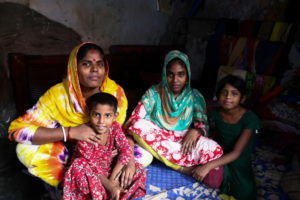Oxfam What She Makes Feature
Author: Katie Langmore
Chameli* is paid about 51 cents** an hour for her work in a Bangladesh factory supplying clothes to big brands including Big W. So, Oxfam’s What She Makes campaign is working to ensure women like Chameli are paid a living wage, one brand at a time.

The thing Chameli wants most for her three daughters — aged 5, 12, and 14 at the time of the interview — is an education. But her family’s story is one of a cycle of poverty trapping one generation after another. Chameli left school at age 11 to work. For the past eight years, she has worked in the garment sector, doing 10 to 11-hour days and taking home as little as $128 a month. Even when Chameli works overtime — as late as 3:00 am during busy shipment times — the most she is paid is $165 a month.
Battling to afford the basics, Chameli and her husband can’t afford to send their daughters to school. Recently they were forced to make the painful decision to allow their eldest daughter to follow the path of her mother and work in a garment factory.
The family of five live in a crowded compound on the outskirts of Dhaka in a 3.6m by 2.4m room, where the two youngest girls sleep on the floor. They share two stoves and one bathroom with five other families living in similarly cramped and uncomfortable conditions. The family’s diet consists mainly of mashed potato and spinach, with fish once or twice a week and meat just once a month. Despite Chameli’s husband and daughter now working and contributing to the household’s income, the family is barely scraping by.
“The thing that motivates me the most, I just think if I don’t work, my children won’t get any food, then I give the strength to myself.”
If paid a living wage, Chameli envisages there would be many changes. “I would feel peaceful then. I would be able to eat and manage my children’s education.”
In 2018, Oxfam Australia visited and interviewed hundreds of garment workers in Bangladesh, amplifying the voices of the women who make our clothes. The resulting report, Made in Poverty: The True Price of Fashion, provided the first in-depth investigation of its kind into the supply chains of big Australian brands and exposes the hardships of everyday life for the workers, mainly women, who are an essential part of a lucrative industry.
The report revealed that of surveyed garment workers in Bangladesh:
- 91% can’t afford enough food to feed themselves and their children.
- 99% regularly work overtime.
- 72% cannot afford proper treatment when they or their family are sick.
- 96% live in rented housing and 76% don’t have running water in their home.
The report also revealed the pressures placed on factory operators and owners by Australian-based brands to keep costs low — and in turn, keep wages at levels that deny workers and their families’ decent lives.
Since 2017, Oxfam Australia’s What She Makes campaign has been putting pressure on big brands to ensure living wages are paid to factory workers in the garment industry. Since the campaign began, more than 135,000 people have signed the pledge to stand with the women who make our clothes. People have sent thousands of emails to brands, handwritten dozens of letters to CEOs, left hundreds of cheeky messages in fitting rooms, shared stories on social media, and held inspiring What She Makes events around the country.
To increase pressure, Oxfam Australia released its well-known Naughty or Nice list before Christmas 2019, highlighting which brands have committed to supply-chain transparency and the campaign’s mission of ensuring living wages are paid.
To date, more than a dozen big brands — including Kmart, Cotton On, Bonds, Gorman, and Best & Less — have made a real commitment to taking the necessary steps to paying their garment workers a living wage. Oxfam Australia will continue to put pressure on Australia’s big brands and stand with the women who make our clothes, to ensure they earn a wage that provides food, utilities, housing, healthcare, education, clothing, transportation, and savings; a living wage.
Visit here for more information and to support the What She Makes campaign.
* Name changed to protect identity
** Figures correct at time of interview






